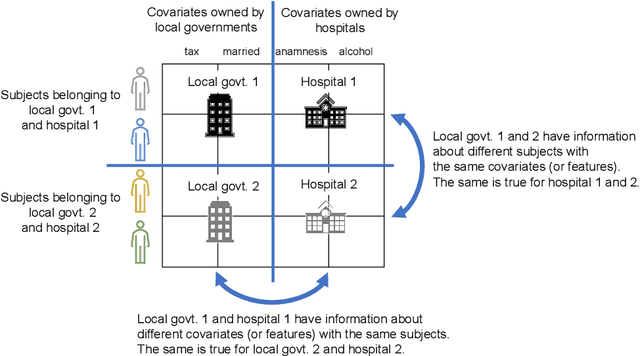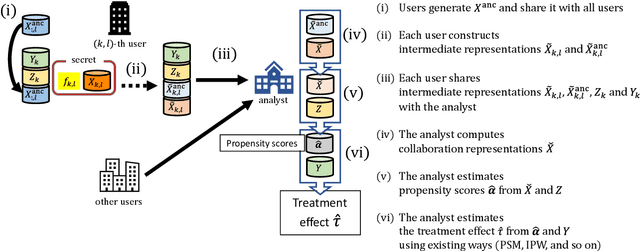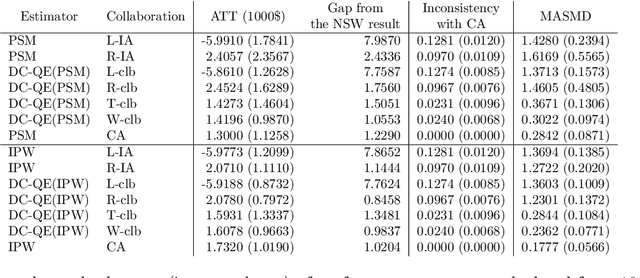Yuji Kawamata
Single-Round Clustered Federated Learning via Data Collaboration Analysis for Non-IID Data
Jan 14, 2026Abstract:Federated Learning (FL) enables distributed learning across multiple clients without sharing raw data. When statistical heterogeneity across clients is severe, Clustered Federated Learning (CFL) can improve performance by grouping similar clients and training cluster-wise models. However, most CFL approaches rely on multiple communication rounds for cluster estimation and model updates, which limits their practicality under tight constraints on communication rounds. We propose Data Collaboration-based Clustered Federated Learning (DC-CFL), a single-round framework that completes both client clustering and cluster-wise learning, using only the information shared in DC analysis. DC-CFL quantifies inter-client similarity via total variation distance between label distributions, estimates clusters using hierarchical clustering, and performs cluster-wise learning via DC analysis. Experiments on multiple open datasets under representative non-IID conditions show that DC-CFL achieves accuracy comparable to multi-round baselines while requiring only one communication round. These results indicate that DC-CFL is a practical alternative for collaborative AI model development when multiple communication rounds are impractical.
A new type of federated clustering: A non-model-sharing approach
Jun 11, 2025Abstract:In recent years, the growing need to leverage sensitive data across institutions has led to increased attention on federated learning (FL), a decentralized machine learning paradigm that enables model training without sharing raw data. However, existing FL-based clustering methods, known as federated clustering, typically assume simple data partitioning scenarios such as horizontal or vertical splits, and cannot handle more complex distributed structures. This study proposes data collaboration clustering (DC-Clustering), a novel federated clustering method that supports clustering over complex data partitioning scenarios where horizontal and vertical splits coexist. In DC-Clustering, each institution shares only intermediate representations instead of raw data, ensuring privacy preservation while enabling collaborative clustering. The method allows flexible selection between k-means and spectral clustering, and achieves final results with a single round of communication with the central server. We conducted extensive experiments using synthetic and open benchmark datasets. The results show that our method achieves clustering performance comparable to centralized clustering where all data are pooled. DC-Clustering addresses an important gap in current FL research by enabling effective knowledge discovery from distributed heterogeneous data. Its practical properties -- privacy preservation, communication efficiency, and flexibility -- make it a promising tool for privacy-sensitive domains such as healthcare and finance.
Estimation of conditional average treatment effects on distributed data: A privacy-preserving approach
Feb 05, 2024Abstract:Estimation of conditional average treatment effects (CATEs) is an important topic in various fields such as medical and social sciences. CATEs can be estimated with high accuracy if distributed data across multiple parties can be centralized. However, it is difficult to aggregate such data if they contain privacy information. To address this issue, we proposed data collaboration double machine learning (DC-DML), a method that can estimate CATE models with privacy preservation of distributed data, and evaluated the method through numerical experiments. Our contributions are summarized in the following three points. First, our method enables estimation and testing of semi-parametric CATE models without iterative communication on distributed data. Semi-parametric or non-parametric CATE models enable estimation and testing that is more robust to model mis-specification than parametric models. However, to our knowledge, no communication-efficient method has been proposed for estimating and testing semi-parametric or non-parametric CATE models on distributed data. Second, our method enables collaborative estimation between different parties as well as multiple time points because the dimensionality-reduced intermediate representations can be accumulated. Third, our method performed as well or better than other methods in evaluation experiments using synthetic, semi-synthetic and real-world datasets.
Collaborative causal inference on distributed data
Aug 16, 2022



Abstract:The development of technologies for causal inference with the privacy preservation of distributed data has attracted considerable attention in recent years. To address this issue, we propose a quasi-experiment based on data collaboration (DC-QE) that enables causal inference from distributed data with privacy preservation. Our method preserves the privacy of private data by sharing only dimensionality-reduced intermediate representations, which are individually constructed by each party. Moreover, our method can reduce both random errors and biases, whereas existing methods can only reduce random errors in the estimation of treatment effects. Through numerical experiments on both artificial and real-world data, we confirmed that our method can lead to better estimation results than individual analyses. With the spread of our method, intermediate representations can be published as open data to help researchers find causalities and accumulated as a knowledge base.
 Add to Chrome
Add to Chrome Add to Firefox
Add to Firefox Add to Edge
Add to Edge